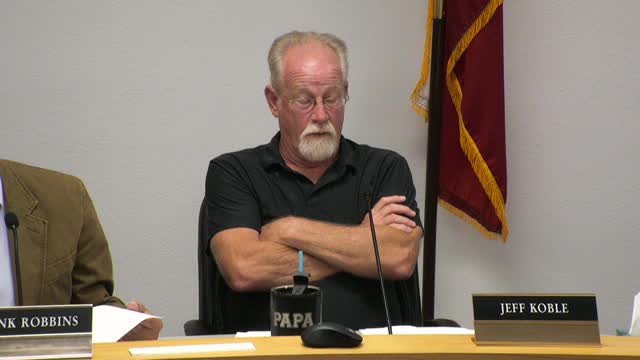Lago Vista officials discuss drainage solutions and use of vacant lots for water retention
August 06, 2025 | Lago Vista, Travis County, Texas
This article was created by AI summarizing key points discussed. AI makes mistakes, so for full details and context, please refer to the video of the full meeting. Please report any errors so we can fix them. Report an error »

The Lago Vista Building and Standards Commission convened on August 6, 2025, to address pressing issues related to drainage and construction standards in the city. The meeting focused on improving drainage systems, particularly in older areas of Lago Vista, where many homes lack adequate ditches and drainage solutions.
Commission members discussed the challenges posed by homes situated below street level, emphasizing the need for tailored drainage solutions that consider the unique topography of each property. One member highlighted the importance of common sense in evaluating drainage needs, suggesting that site-specific assessments should guide construction permits.
A significant point of discussion was the distinction between detention and retention systems. Detention systems, which control the rate of water runoff, were favored over retention systems, which can create stagnant water and mosquito breeding grounds. The commission acknowledged that many older homes may not have sufficient space for effective drainage solutions, complicating compliance with current regulations.
The conversation also touched on the city's past drainage strategies, with a member recalling a drainage study from 2011 that prioritized rapid water removal. This approach, however, has led to flooding in certain areas, prompting a reevaluation of strategies to start improvements from lower elevations and work upwards.
An innovative proposal emerged regarding the use of vacant lots for water retention. One member suggested that the city could negotiate with lot owners to utilize these spaces for shallow basins to manage excess runoff, potentially offering tax incentives to encourage participation. This idea aims to create additional water storage without requiring significant infrastructure investment.
The meeting concluded with a consensus on the need for further studies and discussions to refine drainage strategies, ensuring that future construction adheres to improved standards while addressing the unique challenges of Lago Vista's landscape. The commission plans to continue exploring these solutions in upcoming sessions.
Commission members discussed the challenges posed by homes situated below street level, emphasizing the need for tailored drainage solutions that consider the unique topography of each property. One member highlighted the importance of common sense in evaluating drainage needs, suggesting that site-specific assessments should guide construction permits.
A significant point of discussion was the distinction between detention and retention systems. Detention systems, which control the rate of water runoff, were favored over retention systems, which can create stagnant water and mosquito breeding grounds. The commission acknowledged that many older homes may not have sufficient space for effective drainage solutions, complicating compliance with current regulations.
The conversation also touched on the city's past drainage strategies, with a member recalling a drainage study from 2011 that prioritized rapid water removal. This approach, however, has led to flooding in certain areas, prompting a reevaluation of strategies to start improvements from lower elevations and work upwards.
An innovative proposal emerged regarding the use of vacant lots for water retention. One member suggested that the city could negotiate with lot owners to utilize these spaces for shallow basins to manage excess runoff, potentially offering tax incentives to encourage participation. This idea aims to create additional water storage without requiring significant infrastructure investment.
The meeting concluded with a consensus on the need for further studies and discussions to refine drainage strategies, ensuring that future construction adheres to improved standards while addressing the unique challenges of Lago Vista's landscape. The commission plans to continue exploring these solutions in upcoming sessions.
View full meeting
This article is based on a recent meeting—watch the full video and explore the complete transcript for deeper insights into the discussion.
View full meeting
